Kuyavian-Pomeranian Voivodeship
Województwo kujawsko-pomorskie | |
|---|---|
 Flag 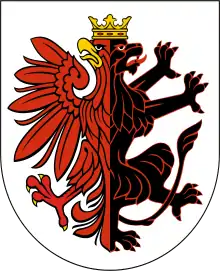 Coat of arms | |
.svg.png.webp) Location within Poland | |
 Division into counties | |
| Country | |
| Seats | Bydgoszcz (voivode), Toruń (executive board, Sejmik) |
| Counties | 4 cities, 19 land counties *
|
| Government | |
| • Body | Voivode, Executive board, Sejmik |
| • Voivode | Mikołaj Bogdanowicz (PiS) |
| • Voivodeship marshal | Piotr Całbecki (KO) |
| • Chairperson of the Sejmik | Elżbieta Piniewska (KO) |
| Area | |
| • Total | 17,969 km2 (6,938 sq mi) |
| Population (2019) | |
| • Total | 2,074,517 |
| • Density | 120/km2 (300/sq mi) |
| • Urban | 1,223,809 |
| • Rural | 850,708 |
| GDP | |
| • Total | €25 billion |
| • Per capita | €12,100 |
| ISO 3166 code | PL-04 |
| Vehicle registration | C |
| HDI (2019) | 0.862[2] very high · 14th |
| Website | http://www.kujawsko-pomorskie.pl |
| |
The Kuyavian–Pomeranian Voivodeship (Polish: województwo kujawsko-pomorskie [vɔjɛˈvut͡stfɔ kuˈjafskɔ pɔˈmɔrskʲɛ] ⓘ), also known as Cuiavian–Pomeranian Voivodeship, Kujawy–Pomerania Province,[3] or simply Kujawsko–Pomorskie,[4] is one of the 16 voivodeships (provinces) into which Poland is divided. It was created on 1 January 1999 and is situated in mid-northern Poland, on the boundary between the two historic regions from which it takes its name: Kuyavia (Polish: Kujawy) and Pomerania (Polish: Pomorze). Its two chief cities, serving as the province's joint capitals, are Bydgoszcz and Toruń.
History
The Kuyavian–Pomeranian Voivodeship was created on 1 January 1999, as a result of the Polish local government reforms adopted in 1998. It consisted of territory from the former Bydgoszcz, Toruń and Włocławek Voivodeships.
The area now known as Kuyavia-Pomerania was previously divided between the region of Kuyavia, Chełmno Land, Dobrzyń Land, Greater Poland (including Pałuki and Krajna) and, on a smaller scale, also Pomerania. Of the two principal cities of today's Kuyavian–Pomeranian voivodeship, one (Bydgoszcz) was historically located in Kuyavia, while the other (Toruń) was an important town of Chełmno Land.
Administration and territory

The functions of regional capital are split between Bydgoszcz and Toruń. Bydgoszcz serves as the seat of the centrally appointed governor or voivode (Polish: wojewoda), while Toruń is the seat of the elected Regional Assembly (sejmik), and of the executive elected by that assembly, headed by the voivodeship marshal (marszałek województwa).
The Kuyavian–Pomeranian Voivodeship is bordered by five other voivodeships. These are Pomeranian Voivodeship to the north, Warmian–Masurian Voivodeship to the north-east, Masovian Voivodeship to the east, Łódź Voivodeship across a short boundary to the south, and Greater Poland Voivodeship to the south and west.
Cities and towns



.JPG.webp)
The voivodeship contains 5 cities and 47 towns. These are listed below in descending order of population (according to official figures for 2019[5]):
- Bydgoszcz (349,021)
- Toruń (201,798)
- Włocławek (110,287)
- Grudziądz (94,732)
- Inowrocław (72,786)
Towns:
- Brodnica (28,788)
- Świecie (25,723)
- Chełmno (19,605)
- Nakło nad Notecią (18,281)
- Rypin (16,227)
- Solec Kujawski (15,652)
- Chełmża (14,503)
- Lipno (14,399)
- Żnin (13,864)
- Tuchola (13,621)
- Wąbrzeźno (13,570)
- Golub-Dobrzyń (12,563)
- Aleksandrów Kujawski (12,147)
- Mogilno (11,836)
- Koronowo (11,162)
- Ciechocinek (10,590)
- Szubin (9,556)
- Sępólno Krajeńskie (9,091)
- Kruszwica (8,809)
- Janikowo (8,745)
- Barcin (7,408)
- Gniewkowo (7,110)
- Więcbork (5,950)
- Nowe (5,827)
- Pakość (5,706)
- Strzelno (5,631)
- Radziejów (5,578)
- Kcynia (4,657)
- Brześć Kujawski (4,642)
- Łabiszyn (4,472)
- Piotrków Kujawski (4,456)
- Mrocza (4,350)
- Kowalewo Pomorskie (4,130)
- Janowiec Wielkopolski (3,953)
- Jabłonowo Pomorskie (3,754)
- Skępe (3,620)
- Kowal (3,484)
- Łasin (3,254)
- Lubraniec (2,999)
- Izbica Kujawska (2,609)
- Kamień Krajeński (2,390)
- Dobrzyń nad Wisłą (2,127)
- Chodecz (1,894)
- Nieszawa (1,853)
- Radzyń Chełmiński (1,847)
- Lubień Kujawski (1,391)
Economy
The Gross domestic product (GDP) of the province was 21.8 billion euros in 2018, accounting for 4.4% of Polish economic output. GDP per capita adjusted for purchasing power was 17,300 euros or 57% of the EU27 average in the same year. The GDP per employee was 64% of the EU average.[6]
Transportation
Transportation infrastructure is of critical importance to the voivodeship's economy. Kuyavia-Pomerania is a major node in the Polish transportation system. Railway lines from the South and East pass through Bydgoszcz to connect to the major ports on the Baltic Sea. In addition to this, Bydgoszcz is home to the rolling stock manufacturer PESA SA, Poland's largest and most modern producer of railway and tram products. The province's sole international airport, Ignacy Jan Paderewski Airport, is located in Bydgoszcz and has connections to a number of European destinations as well as Warsaw, which are all operated by either Irish carrier Ryanair or LOT Polish Airlines.
The main railway stations of the province are Bydgoszcz main station and Toruń main station; both stations are served by fast PKP Intercity trains which connect them with the capital Warsaw, as well as other major Polish cities. In addition to these fast express services, inter-regional trains are operated by the firm Przewozy Regionalne, while domestic rail transportation within the voivodeship is provided by Arriva RP, a private firm to which the provincial government subcontracted the provision of rail transport.
All major towns of the province have municipal transportation companies operating buses, while Bydgoszcz, Toruń and Grudziądz also have extensive tram systems.
Politics
The Kuyavian-Pomeranian voivodeship's government is headed by the province's voivode (governor) who is appointed by the Polish Prime Minister. The voivode is then assisted in performing his duties by the voivodeship's marshal, who is the appointed speaker for the voivodeship's executive and is elected by the sejmik (provincial assembly). The current voivode of Kuyavia-Pomerania is Ewa Monika Mes, and the present marshal is Piotr Całbecki.
The Sejmik of Kuyavia-Pomerania consists of 33 members.
| Party | Votes | % | Total seats held |
|---|---|---|---|
| Civic Platform (PO) | 218,004 | 33.81 | 16 |
| Law and Justice (PiS) | 114,557 | 17.77 | 6 |
| Democratic Left Alliance (SLD) | 111,885 | 17.35 | 6 |
| Polish People's Party (PSL) | 93,445 | 14.49 | 5 |
| Others | 106,877 | 16.58 | 0 |
| Total | 644,768 | 100.00 | 33 |
| |||
Governors
| Name | Period |
|---|---|
| Józef Rogacki | 1 January 1999 – 21 October 2001 |
| Romuald Kosieniak | 21 October 2001 – 26 January 2006 |
| Józef Ramlau | 26 January 2006 – 24 July 2006 |
| Marzenna Drab (acting) | 24 July 2006 – 7 November 2006 |
| Zbigniew Hoffmann | 7 November 2006 – 29 November 2007 |
| Rafał Bruski | 29 November 2007 – 13 December 2010 |
| Ewa Mes | 14 December 2010–present |
Administrative division
The Kuyavian-Pomeranian Voivodeship is divided into 23 counties (powiats): 4 city counties and 19 land counties. These are further divided into 144 gminas.
The counties are listed in the following table (ordering within categories is by decreasing population).
| English and Polish names |
Area (km2) |
Population (2019)[5] |
Seat | Other towns | Total gminas |
| City counties | |||||
| Bydgoszcz | 175 | 349,021 | 1 | ||
| Toruń | 116 | 201,798 | 1 | ||
| Włocławek | 84 | 110,287 | 1 | ||
| Grudziądz | 58 | 94,732 | 1 | ||
| Land counties | |||||
| Inowrocław County powiat inowrocławski |
1,225 | 160,216 | Inowrocław | Kruszwica, Janikowo, Gniewkowo, Pakość | 9 |
| Bydgoszcz County powiat bydgoski |
1,395 | 118,041 | Bydgoszcz * | Solec Kujawski, Koronowo | 8 |
| Toruń County powiat toruński |
1,230 | 107,641 | Toruń * | Chełmża | 9 |
| Świecie County powiat świecki |
1,473 | 99,154 | Świecie | Nowe | 11 |
| Nakło County powiat nakielski |
1,120 | 86,449 | Nakło nad Notecią | Szubin, Kcynia, Mrocza | 5 |
| Włocławek County powiat włocławski |
1,472 | 86,131 | Włocławek * | Brześć Kujawski, Kowal, Lubraniec, Izbica Kujawska, Chodecz, Lubień Kujawski | 13 |
| Brodnica County powiat brodnicki |
1,039 | 78,935 | Brodnica | Jabłonowo Pomorskie, Górzno | 10 |
| Żnin County powiat żniński |
985 | 70,234 | Żnin | Barcin, Łabiszyn, Janowiec Wielkopolski | 6 |
| Lipno County powiat lipnowski |
1,016 | 65,869 | Lipno | Skępe, Dobrzyń nad Wisłą | 9 |
| Aleksandrów County powiat aleksandrowski |
476 | 55,150 | Aleksandrów Kujawski | Ciechocinek, Nieszawa | 9 |
| Chełmno County powiat chełmiński |
528 | 52,018 | Chełmno | 7 | |
| Tuchola County powiat tucholski |
1,075 | 48,329 | Tuchola | 6 | |
| Mogilno County powiat mogileński |
676 | 45,756 | Mogilno | Strzelno | 4 |
| Golub-Dobrzyń County powiat golubsko-dobrzyński |
613 | 45,059 | Golub-Dobrzyń | Kowalewo Pomorskie | 6 |
| Rypin County powiat rypiński |
587 | 43,618 | Rypin | 6 | |
| Sępólno County powiat sępoleński |
791 | 41,055 | Sępólno Krajeńskie | Więcbork, Kamień Krajeński | 4 |
| Radziejów County powiat radziejowski |
607 | 40,546 | Radziejów | Piotrków Kujawski | 7 |
| Grudziądz County powiat grudziądzki |
728 | 40,181 | Grudziądz * | Łasin, Radzyń Chełmiński | 6 |
| Wąbrzeźno County powiat wąbrzeski |
501 | 34,297 | Wąbrzeźno | 5 | |
| * seat not part of the county | |||||
Protected areas
Protected areas in Kuyavian-Pomeranian Voivodeship include the nine Landscape Parks listed below.
- Brodnica Landscape Park (partly in Warmian-Masurian Voivodeship)
- Chełmno Landscape Park
- Gopło Landscape Park
- Górzno-Lidzbark Landscape Park (partly in Masovian and Warmian-Masurian Voivodeships)
- Gostynin-Włocławek Landscape Park (partly in Masovian Voivodeship)
- Krajna Landscape Park
- Tuchola Landscape Park (partly in Pomeranian Voivodeship)
- Vistula Landscape Park
- Wda Landscape Park
Gallery
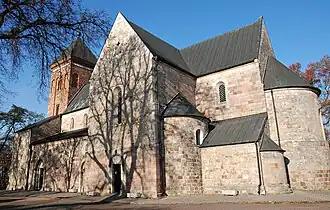
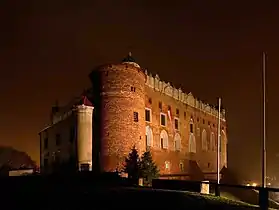
_ID_601491.jpg.webp) Market Square in Chełmno
Market Square in Chełmno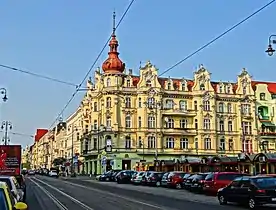 Liberty Square in Bydgoszcz
Liberty Square in Bydgoszcz
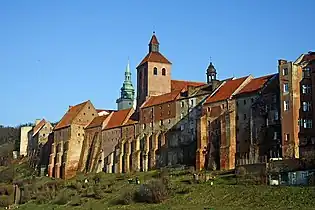
 Nicolaus Copernicus House in Toruń
Nicolaus Copernicus House in Toruń Bydgoszcz Old Town
Bydgoszcz Old Town.jpg.webp) Graduation towers in Ciechocinek
Graduation towers in Ciechocinek Town hall in Świecie
Town hall in Świecie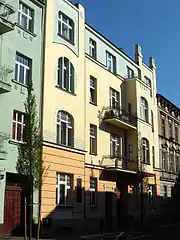 Birthplace of cryptologist Marian Rejewski in Bydgoszcz
Birthplace of cryptologist Marian Rejewski in Bydgoszcz
See also
Notes
- ↑ "EU regions by GDP, Eurostat". Retrieved 18 September 2023.
- ↑ "Sub-national HDI – Subnational HDI – Global Data Lab". globaldatalab.org. Radboud University Nijmegen. Retrieved 2021-12-13.
- ↑ Arkadiusz Belczyk, Tłumaczenie polskich nazw geograficznych na język angielski Archived 2016-03-03 at the Wayback Machine [Translation of Polish Geographical Names into English], 2002–2006.
- ↑ "Kujawsko-Pomorskie invites you!". Urząd Marszałkowski Województwa Kujawsko-Pomorskiego. 2007. Retrieved July 31, 2011.
- 1 2 GUS. "Population. Size and structure and vital statistics in Poland by territorial division in 2019. As of 30th June". stat.gov.pl. Archived from the original on 2021-04-19. Retrieved 2020-09-11.
- ↑ "Regional GDP per capita ranged from 30% to 263% of the EU average in 2018". Eurostat.
- ↑ "Kuyavian-Pomeranian Regional Assembly elections". State Electoral Commission. Retrieved 2011-05-28.


